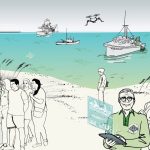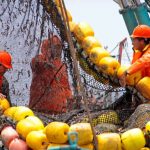The conclusion in the early hours of this morning (26 November) of the EU/Norway negotiations to decide quotas for jointly managed North Sea stocks for 2008 has resulted in a mixed bag of fortunes for the Scottish fishing.
For the Scottish fishing industry, the annual negotiations concluded in Brussels between the EU and Norway is every bit as important as the December Council of Ministers meeting. Quotas for seven North Sea stocks are decided at these talks including, for Scotland, cod, haddock, herring and a share of the more widely dispersed blue whiting.
The final outcome for the Scottish mainstay North Sea stocks is: cod +10%; haddock -15%; herring -41%; whiting -25%; saithe +10%; plaice -2.5%. A small North Sea component of the wider ranging mackerel stock has been reduced by 9%.
Cod now attracts disproportionate attention in these negotiations – its economic impact is small (at a single figure percentage of Scottish overall whitefish value) – but it has become iconic in the minds of the public; the others are economically much more significant with haddock and herring being mainstay stocks.
Bertie Armstrong, chief executive of the Scottish Fishermen’s Federation said: “The outcome is a mixed bag – an 11% increase in North Sea cod quota is welcome and will reduce discarding as the stock recovers in response to Scottish conservation initiatives. Whilst a 15% increase had been a more realistic target, the final agreed figure could have been worse.
“With sustainability forming the negotiation backdrop, the science had pointed to belt tightening in most stocks. However, this is a political process with both Norway and the European Commission aiming at the best deal for itself. This hands an advantage to Norway with its single set of priorities and forces the EC to seek compromise in its target setting, with each Member State pressing for their unique priorities.
“The outcome for Scotland – a major stakeholder – has some disappointments: cod should have been a little higher; a plan for herring carefully crafted at the pelagic Regional Advisory Council and agreed by ICES and the environmental NGOs has not been accepted by Norway; the allocation of haddock has not got the “banking and borrowing” flexibility that it needs; agreed reductions in the Blue Whiting catch have not been applied equally to Norway and the EU within the deal.”
“The main problem lies however in the fact that although the stocks are not linked biologically, the political process throws them together in a trade to agree an overall package. Rational consideration for individual stocks is left behind. The well-organised UK delegation fought well within the constraints of this less than optimum process.”








